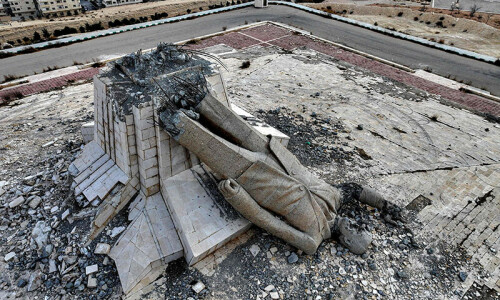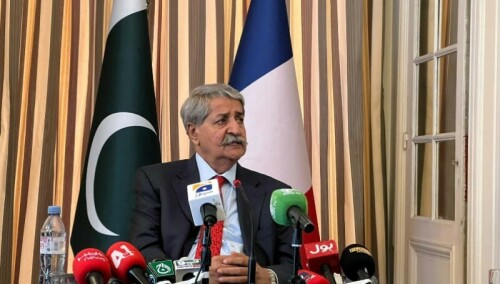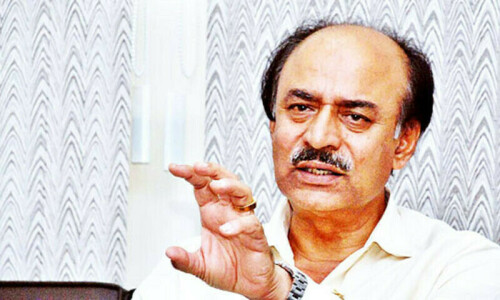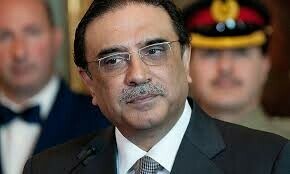ABIDJAN: Morocco set new standards for African football just over 12 months ago at the Qatar World Cup but the pressure is now on to improve a dismal record in the Africa Cup of Nations, which kicks off on Saturday.
Morocco became the first Arab and African country to reach a World Cup semi-final in their thrilling run that captivated the continent but they are now expected to take that form into the Cup of Nations and expunge a record of consistent failure.
Morocco are one of 12 countries in the 24-team field who have had previous success in the continental championship but their only past triumph came almost a half century ago in 1976.
They have a long history since of crashing out unexpectedly when having been cast as favourites.
“I want to at least get to the semi-finals,” coach Walid Regragui told local television channel Arryadia.
They are in Group ‘F’ with DR Congo, Zambia and a Tanzania side who have never won a game at the tournament.
There will many teams eager to scythe them down, particularly a strong challenge from hosts Ivory Coast, Ghana, Nigeria and holders Senegal.
Sadio Mane, who took last weekend off to get married, again headlines a Senegal side that, like Morocco, had success over Brazil in a friendly last year and is bristling with experience and talent.
They were deserved winners of the last Cup of Nations in Cameroon, albeit needing post-match penalties to overcome Egypt in the final.
Senegal are in Group ‘C’ with Cameroon, Gambia and the Guinea of Serhou Guirassy, prolific in the German Bundesliga with VfB Stuttgart and reportedly fine after an injury scare this week.
The Ivorians will also be expected to go deep into the tournament, although often the burden of expectation from home supporters can weigh too heavily.
Egypt in 2006 were the last hosts to win the Cup of Nations, ironically on spot kicks over the Ivory Coast.
The Ivorians kick off proceedings in Saturday’s opening match in Group ‘A’ against Guinea Bissau at the Alassane Ouattara Stadium at Ebimpe, on the outskirts of the economic capital Abidjan.
The 60,000-seat stadium was built for a tournament initially supposed to be played in June and July last year to avoid a clash with the middle of the season in Europe, where so many top African players are based.
However, fears over staging it during the rainy season led to it being pushed back to its more traditional January and February slot.
Matches will be staged in six stadiums, with two venues in Abidjan, including at Ebimpe, which will host the final.
Games will also be played in the capital Yamoussoukro and neighbouring Bouake, as well as in San Pedro on the coast and in Korhogo, in the north near the frontiers with Mali and Burkina Faso.
It is the first AFCON in West Africa since Ghana in 2008, and $1.5 billion has been invested by the Ivorian government.
Authorities will be hoping to avoid anything like the event that overshadowed the last AFCON in Cameroon, where eight people were killed in a crush and stampede outside Yaounde’s Olembe Stadium.
Locals are also hoping that their team, the Elephants, can go all the way and claim a third title. The most recognisable face in their squad is Borussia Dortmund striker Sebastien Haller, who appears regularly on billboards lining Abidjan’s traffic-choked streets.
Nigeria’s squad, spearheaded by African footballer of the year Victor Osimhen, is on paper among their best in years but recent results have been anything but impressive. In November lowly Lesotho held them away in a World Cup qualifier and they also lost last year at home to tiny Guinea Bissau.
The presence of Napoli striker Osimhen gives Nigerians hope their team can go far but they have been dealt a blow with the loss of Bayer Leverkusen forward Victor Boniface to injury.
The Super Eagles will play the hosts as well as Equatorial Guinea and Guinea-Bissau in Group ‘A’.
Egypt, with Mohamed Salah again their talisman, and 2019 winners Algeria join Morocco in heading the challenge from Arabic-speaking north Africa, along with Tunisia who are making a record-extending 16th straight appearance at the finals.
They should have few serious problems getting out of a group also featuring Ghana, Cape Verde and Mozambique.
Other past winners in this years field are Cameroon, the Democratic Republic of Congo, South Africa and Zambia, all of whom have potential to be spoilers.
South Africa are back after missing the last edition, and their team leans heavily on the country’s leading club side, Mamelodi Sundowns.
They meet Tunisia, Mali and Namibia in Group ‘E’.
Published in Dawn, January 13th, 2024












































Dear visitor, the comments section is undergoing an overhaul and will return soon.